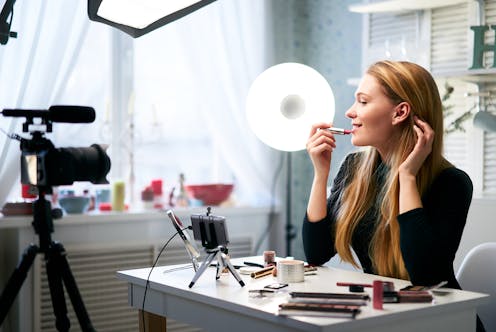how online beauty gurus get followers to trust them by posting negative reviews
- Written by Rebecca Mardon, Senior Lecturer in Marketing, Cardiff University

In a departure from their usual content, TikTok beauty influencers are “de-influencing”, telling viewers what not to buy[1]. Offering uncharacteristically critical product reviews, many are directing their criticism at products that they believe have been overhyped by other influencers on the platform.
The recent interest in de-influencing began with a controversy over a product recommendation. Viewers accused[2] TikTok beauty influencer Mikayla Nogueira of secretly applying false lashes to exaggerate the effect of a mascara that she had been paid to promote. The video and its backlash sparked wider debates surrounding influencers’ authenticity, prompting a deluge of “de-influencing” posts.
While the term “de-influencing” is a new addition to influencers’ vocabularies, the strategy itself has been around for years. In a recent study[3], we explored why people lose trust in the influencers they have so revered, and what influencers do to regain that trust.
We studied influencers who rose to prominence on YouTube as “beauty gurus”. Our participants (followers of these gurus) explained that in the early days of YouTube, vloggers offered unbiased product reviews, often being “brutally honest” about products they didn’t like. These critical reviews were key to many vloggers’ initial popularity. As one participant said, the content “saved us a lot of money”.
As vloggers grew in popularity, the world of influencer marketing was born. Brands capitalised on the trusted guru role by paying or incentivising them to promote products to their loyal followers.
References
- ^ what not to buy (fortune.com)
- ^ Viewers accused (www.buzzfeed.com)
- ^ recent study (doi.org)
- ^ This article is part of Quarter Life (theconversation.com)
- ^ ‘Influencer’ is now a popular career choice for young people – here’s what you should know about the creator economy’s dark side (theconversation.com)
- ^ Binge-eating disorder is more common than many realise, yet it’s rarely discussed – here’s what you need to know (theconversation.com)
- ^ The sharing economy can expose you to liability risks – here’s how to protect yourself (theconversation.com)
- ^ role conflict (doi.org)
- ^ the platform’s trend-driven nature (www.vogue.co.uk)
- ^ Some commentators (www.eternalgoddess.co.uk)







